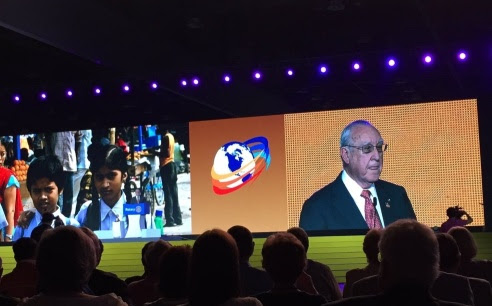
A Greek philosopher once wrote that great enterprises begin with small opportunities. That sounds good, doesn’t it? But you know what? I don’t think it’s true.
Great enterprises don’t begin with small opportunities. They begin with great opportunities. It’s just that great opportunities sometimes have a way of looking small. Every one of us here has been given a great opportunity: the opportunity that came in the form of a Rotarian saying, “I’d like to invite you to a meeting of my Rotary club.” It might have seemed like a small opportunity at the time. But for whatever reasons, for each of us, it also seemed like a good idea: an interesting chance to meet some good people, and do some good work, and have some fun along the way.
Looking back on that now, I think every one of us recognizes the opportunity to serve through Rotary for what it truly is: not a small opportunity, but a great one — the great opportunity that led all of us to the great enterprise that is Rotary.
And what I want all of us to take from that — today, tomorrow, and in the year ahead — is that the only difference between a small opportunity and a great one is what you do with it.
Each one of us has been given the opportunity to serve in Rotary. What we do with that opportunity, that’s up to each of us. But the decisions we make — they won’t end with us.
The effects of our work, our decisions, will ripple out all over the world to people we’ll never meet but whose lives Rotary will change.
Like the women who, right now, at this moment, are walking down dirt paths with water jars on their heads, on their way to get water from a polluted stream that’s an hour away from their homes. Next year, they won’t have to carry that water anymore, because of the bore wells that Rotary will dig.
The girls in India who have to leave school at age 12 or 13 because their school has no toilets: Next year, those girls won’t have to leave, because of toilet blocks that Rotary will build.
And the children in Pakistan and Afghanistan, who live every day with the risk of being paralyzed by polio: Next year, they won’t have to worry about that, because we’ll have vaccinated those children. And soon, their countries and the whole world will be polio free. All of that is what can happen — not what will happen, but what can happen — when we recognize that the opportunity to join Rotary was the opportunity of a lifetime. A great opportunity to change the world for the better, forever, through Rotary Serving Humanity.
My friends, we are at a crossroads in Rotary. We are looking ahead at a Rotary year that may one day be known as the greatest in our history: the year that polio finally falls. All of Southeast Asia, and all of Africa, are now polio-free. Only two countries now share one remaining reservoir of the wild poliovirus. And those two countries, Afghanistan and Pakistan, are giving it everything they have, with all the help we can give them, to make this the year that the last child contracts the last case of polio caused by the wild poliovirus.
But it is so important that we all understand that when that happens, it won’t be over yet. Because getting to zero doesn’t mean that we’ve gotten to the end.
We’ll only be done when we’ve reached our goal: a world that is certified polio-free. And that means three full years without one single case.
That means that we have to keep up all of our efforts, not just for another few months but for at least another three years. And we can’t forget that we are still $1.5 billion short of the money we’ll need to get the job done.
It’s not our job to raise all of that money ourselves. But it is our job to advocate, anywhere and everywhere we can, to make sure that it is raised. We need to be talking about polio, tweeting about polio, putting polio front and center in the minds of our communities and our elected officials.
We started this more than 30 years ago now. We’ve stuck with it all this time. And soon — 1.85 billion Rotary dollars and more than 2.5 billion immunized children later — we’re going to finish it.
And when that moment comes, we need to be ready for it, to be sure that we are recognized for that success, and leverage that success, into more partnerships, greater growth, and even more ambitious service in the decades to come.
We need to make sure that everyone knows the role that Rotary has played in making the world polio-free. That is tremendously important, because the more we are known for what we’ve achieved, the more we’ll be able to attract the partners, the funding, and — most important of all — the members, to achieve even more.
We’re working hard at RI to be sure that Rotary does get that credit. But it can’t all happen in Evanston. We need you to get the word out through your clubs and in your communities about what Rotary is and what we do.
And we need to be sure that your clubs are ready for the moment that polio is finally eradicated. When people who share our values, who want to do good, see that Rotary is a place that can change the world, we need to be ready for these members. Every club needs to be ready.
My friends, we are entering into historic times.
You told us that we need to change and become more flexible so that Rotary service will be attractive to younger members and recent retirees and working people. You spoke with clarity, and groundbreaking legislation was passed this year at the Council on Legislation. I am pleased to share with you that Rotarians the world over are responding with great excitement.
You told us that Rotary needs to be relevant in our second century of service, and because of this, we are entering into the most progressive year in our organization’s history. Clubs have the opportunity to be who they want to be but at the same time remain true to our core.
We need clubs that can not only attract new members but engage them in Rotary service: clubs that are welcoming and active, that truly follow The Four-Way Test. The reason Paul Harris founded Rotary, 111 years ago, is still very much the reason people come to Rotary today: to find people who share their values. People who believe in honesty, diversity, tolerance, friendship, and peace. People who believe that serving humanity is the best thing they can do with their time on this earth.
Whether we’re reading to schoolchildren or building a clinic or fighting polio, even as we change and adapt and move forward, the essence of who we are and what makes a Rotarian doesn’t change.
We’re still based on a classification principle, because our diversity is our strength. We still hang The Four-Way Test on the wall, because high ethical standards don’t ever go out of style. And we still believe, as Paul Harris believed, that serving humanity is the most worthwhile thing any one of us can do with our lives.
We need to seek out new partnerships, opening ourselves more to collaborative relations with other organizations, to achieve even more together. And we need to prioritize continuity in our leadership. Because if there’s one thing we’ve learned from polio, it’s that if we want to go as far as we can, we all have to be moving in the same direction. We have to be serving humanity.
My friends, we are doing so much incredible work already. Judy and I have seen so much of it this year, all over the world. But we could be doing so much more. We need more willing hands, more caring hearts, and more bright minds to move our work forward.
We’re all in this together. We’re all on the same team. If one of us scores, we all score. And we take just as much pride in an assist as we do in a goal. Because the goal we have is one that we all share: to transform the lives of the people who need our help the most. They’re waiting for you. They’re waiting for us — to dig the wells, to build the schools, to put an end to polio.
Every day that you serve in Rotary, you have that opportunity to change lives. Those opportunities might look small. You might sometimes think that what you do doesn’t matter.
But they’re not small. And everything you do matters, especially to the people you help and the people you love, in this generation and the next and the next. Every good work you do in your life makes the world better for them all.
One good work at a time. One day at a time. That’s all it takes.
That’s what we’re here for in Rotary. That’s what we do. That is the responsibility that each one of us accepted when we accepted the privilege of wearing a Rotary pin. To serve humanity — as much as we can, as well as we can.
To change as many lives as we can, for the better.
Not alone. Not as individuals. But together — as a team — through Rotary Serving Humanity.
Source: Rotary International

 RSS Feed
RSS Feed




